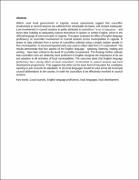Analysing the effect of English language proficiency on Councillor involvement in local council discussions in Uganda
Abstract
Within most local governments in Uganda, annual assessments suggest that councillor involvement in council sessions has suffered from remarkable set-backs, and remains inadequate. Low involvement in council sessions is partly attributed to councillors' level of education - and hence their inability to adequately express themselves in spoken or written English, which is the official language of communication in Uganda. This paper evaluates the effect of English language proficiency on councillor involvement in council sessions across municipalities in Uganda. It draws on data collected from a survey of councillors selected using a simple random sample in five municipalities. A structured questionnaire was used to collect data from 171 respondents. The results demonstrate that four aspects of the English language - speaking, listening, reading and writing - have been critical to the level of councillor involvement. The findings further indicate that councillors who are relatively more proficient in English recognise the importance of its use and adoption in all activities of local municipalities. The outcomes attest that English language proficiency has a strong effect on local councillors' involvement in council sessions and local development programmes. This suggests that either (a) the basic level of education for candidates aspiring to join councils be stipulated; or (b) local languages should be used across all municipal council deliberations in the country, in order for councillors to be effectively involved in council sessions.
Collections
- Research Articles [142]

